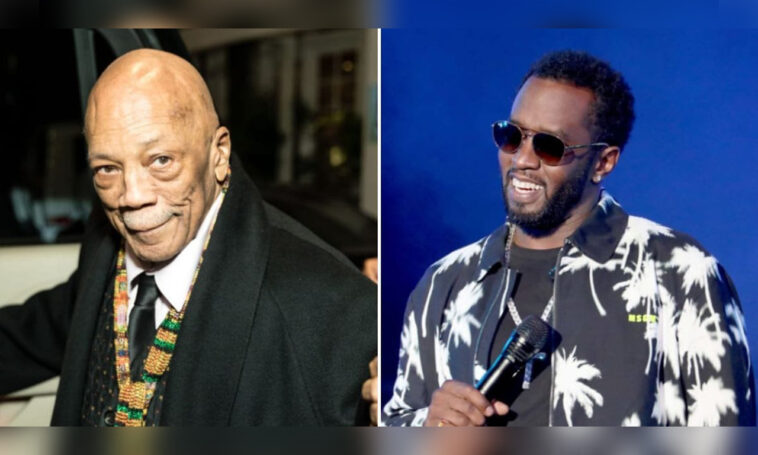When a cultural giant like Quincy Jones makes a remark, especially a critical one, it often resonates long after it’s first spoken. Recently, as the arrest and legal troubles surrounding Sean “Diddy” Combs have come to light, some of Jones’ past comments about Combs’ music career and capabilities have been brought back into the spotlight, sparking renewed interest and debate about Diddy’s legacy in the music industry.
Back in June 2012, at a Spotify event, Quincy Jones was openly skeptical about Diddy’s credentials as a music producer. According to the Huffington Post, Jones commented that the “Coming Home artist couldn’t recognize a B flat,” implying that Combs lacked formal musical training and a nuanced understanding of music theory. Rather than seeing Diddy as a groundbreaking producer, Jones categorized him as a marketing genius, noting, “P. Diddy has a doctorate in marketing…. He’s got clothing lines and Ciroc vodka.” Jones’ words seemed to emphasize Combs’ prowess in business rather than in musical artistry.
These remarks naturally drew a lot of attention at the time, leading Jones to clarify his position on social media. He posted on Facebook, stating,
“No controversy, no diss. I have nothing but love and respect for Diddy and all that he has achieved as an artist and an executive. Always have and always will,”
Despite this conciliatory message, Jones’ original comments left a lasting impression. While he claimed no malice, his assessment raised questions about the difference between business acumen and musical talent—particularly in an era where success in the music industry can often stem from strong branding rather than musical innovation.
Fast forward to today, and Jones’ perspective appears, in some ways, almost prescient. In recent years, Diddy’s musical output has failed to evolve in a way that resonates with contemporary audiences. Critics argue that his recent work lacks originality and sounds like it’s stuck in the late ’90s or early 2000s, with little adaptation to the new directions in music production and sound that define today’s industry. Many see him as a nostalgic figure rather than a driving force in modern music, a reality that perhaps indicates his primary strength was in marketing and self-promotion rather than in musical production.
Now, however, Diddy faces serious legal accusations, including allegations of sexual assault, sex trafficking, racketeering, and conspiracy. These charges have cast a dark shadow over his public image, and regardless of the legal outcomes, his legacy in music is becoming increasingly overshadowed by his legal troubles. Rather than being remembered as a music mogul, his legacy may be defined by these controversies. Public memory, especially in the digital age, is quick to reduce complex individuals to singular narratives, and in Diddy’s case, these legal issues could permanently alter how he is remembered in pop culture history.
In this context, Jones’ earlier remarks about Diddy’s music seem to take on added weight. Quincy Jones is widely respected as a legendary producer, having worked with icons like Frank Sinatra, Dinah Washington, Miles Davis, and Michael Jackson. His insights carry the weight of decades spent collaborating with true musical legends, and his criticism of Diddy’s musical knowledge and capabilities was rooted in a deep understanding of what makes a producer exceptional. Jones has witnessed the evolution of music over time and worked with artists who were constantly innovating and setting new standards. His lukewarm appraisal of Diddy’s production skills highlighted a broader debate about the role of artistry versus image in music.
In the broader sense, Jones’ remarks serve as a reminder that true musical influence extends beyond hit records and commercial success; it requires a deep engagement with the art form. For Jones, a producer’s role is not merely to capitalize on trends or market oneself effectively but to bring out the very best in artists and create timeless music. His critique of Diddy suggests that, in Jones’ eyes, real musical production demands an intuitive grasp of music’s technical aspects and a commitment to pushing creative boundaries—qualities he felt were lacking in Diddy’s work.
In the end, Quincy Jones’ comments on Diddy offer more than just celebrity gossip; they touch on the enduring question of what it means to be influential in music. As Diddy’s future unfolds amidst his legal battles, his music career may never again be the primary focus of his public persona. In the years to come, his legacy could largely be framed by his legal troubles rather than his musical contributions, with Jones’ assessment lingering in the background as an insight into what could have been a different trajectory. While time will tell how Diddy is ultimately remembered, Jones’ words underscore the value of genuine artistry and technical skill in a world where brand often overshadows talent.



